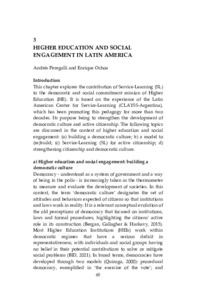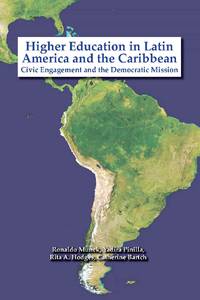Por favor, use este identificador para citar o enlazar este ítem:
https://repositorio.uca.edu.ar/handle/123456789/16296| Campo DC | Valor | Lengua/Idioma |
|---|---|---|
| dc.contributor.author | Peregalli, Andrés | es |
| dc.contributor.author | Ochoa, Enrique | es |
| dc.coverage.spatial | América Latina | es |
| dc.date.accessioned | 2023-05-02T20:37:30Z | - |
| dc.date.available | 2023-05-02T20:37:30Z | - |
| dc.date.issued | 2023 | - |
| dc.identifier.isbn | 978‐1‐908689‐45‐0 | - |
| dc.identifier.uri | https://repositorio.uca.edu.ar/handle/123456789/16296 | - |
| dc.description.abstract | This chapter explores the contribution of Service‐Learning (SL) to the democratic and social commitment mission of Higher Education (HE). It is based on the experience of the Latin American Center for Service‐Learning (CLAYSS‐Argentina), which has been promoting this pedagogy for more than two decades. Its purpose being to strengthen the development of democratic culture and active citizenship. The following topics are discussed in the context of higher education and social engagement: (a) building a democratic culture; b) a model to (re)build; (c) Service‐Learning (SL) for active citizenship; d) strengthening citizenship and democratic culture. a) Higher education and social engagement: building a democratic culture Democracy ‐ understood as a system of government and a way of being in the polis ‐ is increasingly taken as the thermometer to measure and evaluate the development of societies. In this context, the term ‘democratic culture’ designates the set of attitudes and behaviors expected of citizens so that institutions and laws work in reality. It is a relevant conceptual evolution of the old perceptions of democracy that focused on institutions, laws and formal procedures, highlighting the citizensʹ active role in its construction (Bergan, Gallagher & Harkavy, 2015). Most Higher Education Institutions (HEIs) work within democratic regimes that have a serious deficit in representativeness, with individuals and social groups having no belief in their potential contributions to solve or mitigate social problems (BID, 2021). In broad terms, democracies have developed through two models (Quiroga, 2000): procedural democracy, exemplified in ‘the exercise of the vote’; and substantive democracy, exemplified in the active participation of citizens in social, political, and economic processes (active citizenship). | es |
| dc.format | application/pdf | es |
| dc.language.iso | eng | es |
| dc.publisher | Glasnevin Publishing | es |
| dc.rights | Acceso abierto | * |
| dc.rights.uri | http://creativecommons.org/licenses/by-nc-sa/4.0/ | * |
| dc.source | Munck, R. (coord). Higher Education in Latin America and the Caribbean : civic engagement and the democratic mission. Dublin : Machdohni, 2023 | es |
| dc.subject | EDUCACION | es |
| dc.subject | PEDAGOGIA | es |
| dc.subject | CULTURA | es |
| dc.subject | DEMOCRACIA | es |
| dc.subject | COMPROMISO SOCIAL | es |
| dc.subject | CIUDADANIA | es |
| dc.subject | INSTITUCIONALIDAD | es |
| dc.subject | REPRESENTACION POLITICA | es |
| dc.title | Higher education and social engagement in Latin America | es |
| dc.type | Parte de libro | es |
| uca.disciplina | EDUCACION | es |
| uca.issnrd | 1 | es |
| uca.affiliation | Fil: Peregalli, Andrés. Universidad de San Andrés; Argentina | es |
| uca.affiliation | Fil: Peregalli, Andrés. Universidad de la República. Facultad de Humanidades y Ciencias de la Educación; Uruguay | es |
| uca.affiliation | Fil: Ochoa, Enrique. Pontificia Universidad Católica Argentina; Argentina | es |
| uca.version | publishedVersion | es |
| item.fulltext | With Fulltext | - |
| item.languageiso639-1 | en | - |
| item.grantfulltext | open | - |
| crisitem.author.orcid | 0000-0002-0057-7665 | - |
| Aparece en las colecciones: | Libros/partes de libro | |
Ficheros en este ítem:
| Fichero | Descripción | Tamaño | Formato | |
|---|---|---|---|---|
| higher-education-social-engagement.pdf | 295,44 kB | Adobe PDF |  Visualizar/Abrir | |
| higher-education-social-engagement-portada.jpg | 96,3 kB | JPEG |  Visualizar/Abrir |
Visualizaciones de página(s)
75
comprobado en 27-abr-2024
Descarga(s)
65
comprobado en 27-abr-2024
Google ScholarTM
Ver en Google Scholar
Altmetric
Este ítem está sujeto a una Licencia Creative Commons

